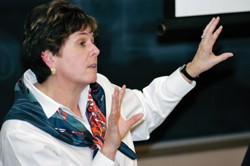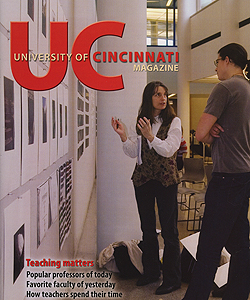The ways professors teach and the ways students learn at the University of Cincinnati are quite diverse. Management professor Ann Welsh is pleased that UC encourages a variety of teaching styles.
Professor says students don't want to waste time

Professor Ann Welsh avoids trying to cover all the material in the textbook in her classes. She says it is "better to learn deeply about a few things."
"One of the reasons we want a diversity of approaches in the classroom is the hope that over an entire college career, all students will have class with someone whose teaching style is consistent with their learning style," she explains. "That is why we don't want complete standardization. We would miss experiencing the richness of the way different people think about things."
When students come to Welsh for advice, the 2006 Cohen Award winner tells them to take classes with as many faculty as they can, in as many disciplines as possible. "It's not that concentrating in your major area is unimportant," she says, "but that a broad foundation is most beneficial for a student in the long run."
Welsh, who has taught at UC for 25 years, believes that the College of Business is fortunate to have a student body that demonstrates "a wonderful work ethic throughout." Yet, she does question the quantity of outside employment that students have.
"Virtually all of our students are employed," the professor notes, "and working many more hours a week than we think they should. While it is co-op experience for some, others are working because they really need the money. More students are older, and many have dependent children. This is an enormous change.
"It may promote a good work ethic, but often at the expense of the students being as reflective as we would wish. College is meant to be a time -- an opportunity -- to think broadly and widely about many different things. I'm sorry to see that the pressures of life are changing that."
One good by-product of busier students, according to Welsh, is that she knows her students want to be in class. They are ready to get down to business as soon as they arrive.
"So much of good teaching is in building great relationships with your students," Welsh says. "Even in large classes, it is possible to create an environment where students have faith and trust that you are not wasting their time, that something good is going to happen."
Really effective teachers are able to give students enough confidence that they feel OK about what may be an uncomfortable journey to learning something new, according to the educator. Even if it may not seem worthwhile immediately, they believe that they eventually will appreciate its importance.
Welsh, who currently serves as chair of the university's Faculty Senate, says that she has learned valuable things about teaching through casual conversations with her colleagues. "As we're walking down the hall, we talk a lot about what we do in the classroom," she says.
"We hear about a class where something went wrong -- and we talk about where it did go wrong -- and another class where everything worked very well. We hear about one another's golden moments, terrible moments and some hysterically funny moments. So much of life is in the little experiences."
Welsh hopes that students understand why their professors choose to work in a college classroom. It's not the money or the hours or a lack of job offers elsewhere.
"We do what we do because we think it makes people's lives better."
Share your favorite faculty stories
John Alexander, American history
Lanthan Camblin, education, human development
Angelene Jamison-Hall, African and African American studies
Michael Sanders, electronic media communications

 Issue Archive
Issue Archive